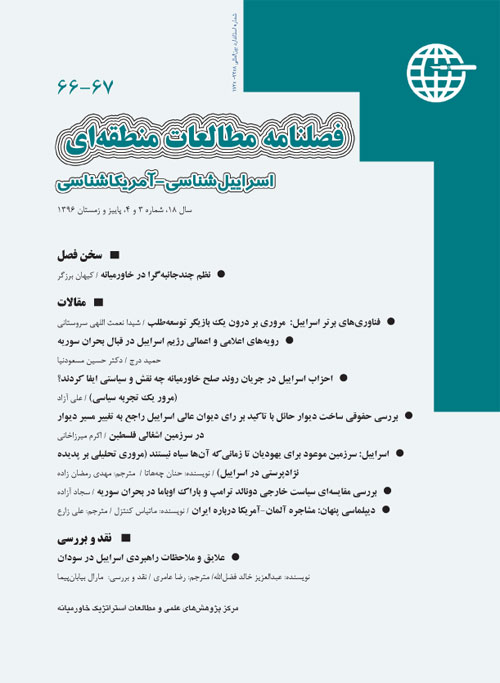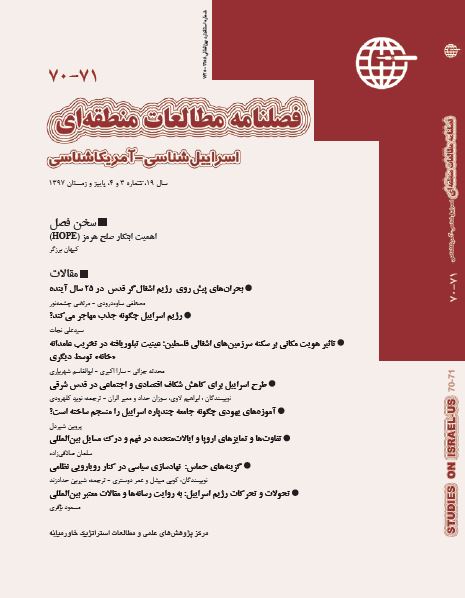فهرست مطالب

نشریه مطالعات منطقه ای
سال هجدهم شماره 4 (پاییز و زمستان 1396)
- تاریخ انتشار: 1398/04/15
- تعداد عناوین: 9
- سخن فصل
-
صفحات 7-10
-
صفحات 141-157
- نقد و بررسی
-
صفحات 159-169
-
Pages 11-24One of the areas that can be effective in advancing the goals of foreign policy of governments is the field of science and technology. Science and technology diplomacy give governments the opportunity to take advantage of technology capabilities as a means to advance their goals. The need to use this tool is to achieve high levels of science and technology. Therefore, governments that have access to high-tech and science facilities can expect to benefit from this type of diplomacy. The Israeli regime has been one of the areas where there has been much support and investment in technology and research and development. Therefore, identifying the state of the technology in this regime can help in understanding the capacity of this regime to use science and technology diplomacy. In this regard, the paper seeks to study the Israeli regime’s capabilities and policies by examining the level of technology and research in IsraelKeywords: Israeli Regime, Diplomacy of Science, Technology, Premier Technologies
-
Pages 25-43Although the Syrian crisis seems to have fallen behind in the past, it is now time to share concessions over the players’ field position. The rise of political developments and popular revolutions in the Arab countries was among the rare phenomena of the early years of the 21st century, in which the Syrian scene unlike other models targeted regional and trans-national tensions. Syria’s role in the political equations of Lebanon and Damascus’s position as a supporter of Islamic resistance has added to the strategic importance of Syria. The presence of Syria in the anti-Israeli resistance axis has led Zionist leaders to regard it as one of the main threats. The Syrian crisis has caused a wave of regional concerns and one of the most important congestion concerns of the Occupied Territories. Israelis worry that if Assad collapse, Syria would become a jolt of Islamists and the calm of Jordan, Golan and Lebanon would be lost. Accordingly, the Israeli authorities are planning to turn Syria into the weakest link in the Islamic Resistance Chain. The current research seeks to answer the main question is that what Zionist regime is pursuing with regard to the Syrian crisis? Our basic assumption is that Tel Aviv, while preventing the emergence of radical religious groups, is calling for a weak Syrians to engage in civil war, in this way the Islamic Resistance Front, and at the top of it, the Islamic Republic of Iran In the region weaken. The current research is descriptive-analytical and based on the theory of defensive realism.Keywords: Zionist Regime, Syrian Crisis, Foreign Policy, Defensive Realism, Resistance Axis
-
Pages 45-78The Arab-Jewish conflict in the Middle East has a longer life than Israel’s history. Today, more than six decades since occupation, Middle East peace has not yet come to an end, and there is no clear horizon for it. Examining the causes of the failure of the Middle East Peace Process, there are various reasons, including the failure of Israeli leaders to the peace. Because paying attention to the value and ideology of the leaders of the Israeli parties has a special place and, therefore, as long as the parties are value-oriented, there will be no peace that guarantees the interests of the other party. Based on the principles of constructive school, there are relatively stable identities and expectations between the Arabs and Israel, which make the parties consider each other as an enemy of the degree. This paradigm also points out that the determinant factor in the behavior of political parties towards the Arabs is not material factors, but rather the norms that have a direct impact on the identity and interests of the Jews.Keywords: Middle East Peace, Israel, Israeli Political Parties, Middle East, Jews-Israel, Palestine
-
Pages 79-102The issue of Palestine and the rights of its people has considerable significance and consideration, and so far, various aspects have been investigated. But perhaps has not analyzed from the perspective of the official Israeli assemblies. Therefore, in the present article, we consider the legitimacy of building a separation wall from the point of view of the judiciary in Israel and, in a comparative study with the International Court of Justice, we will examineKeywords: Separation Wall, Armed Conflict, The Hague, Dispute Resolution, HumanRights, Legitimate Defense, Humanitarian Intervention, Genocide
-
Pages 103-118In August 2018, the Israeli Knesset declared the occupied territories a country specific to Israel, and declared Hebrew as the official language. This ratification means the resignation of the remaining Arabs in the occupied territories. While subjugating and violating the rights of Palestinians living in Israel and the occupied territories of Palestine has been documented, what has been less and properly addressed is how radicalization in Israel is rooted. The extent of racism in Israel does not end only on Muslims and Palestinian Christians, but includes Jews with ethnic minority backgrounds. This article seeks to prove how and why the “Falashahs,” Ethiopian Jews who have been brought to Israel in several mass transfer operations, imagine themselves to be part of the underclass of the Israeli society. They have been discriminated against not only in housing, employment, training, the army, or even in their religious practices, but have been unwittingly exploited as a backbone for the construction of illegal settlements.Keywords: Beta of Israel, Ethiopian Jews, Falasha, Israeli Defense Forces, IsraeliRacism, Joshas Operation, Musa Operation, Solomon Operation, Pe tta Ticova
-
Pages 119-140business position, a comparison of this policy with Obama’s attitude is important. Obama’s foreign policy in Syria has been subject to certain limitations and complexities. The inadequate militant history of Bush’s foreign policy, especially in the Middle East, and the slogan of Obama’s shift in presidential elections are the ones that blocked Obama’s hands on strong action. Obama’s foreign policy in the Syrian crisis managed the complex and expansive crisis of the external and internal crises. Obama’s goals in Syria were to restore the Arab world’s transformations to the liberal- democratic axis and to some extent control of them with the harsh and costly crisis in Syria. He also restored the violent face of the United States in the world and the Middle East, weakened its rivals and enemies, especially the resistance axis, with their energy destruction in Syria, the completion of the larger Middle East process, and the objective realization of the promise of Obama’s change in the presidential election by showing the power of diplomacy and international cooperation totally different from policy of Trump was that it could be said in three words: Syria as a bargaining tool for arms trading, Syria as a punishment card for Iran, and wage from Saudi Arabia, Syria as a chance to consolidate America and the position of Trump in the Republican Electoral Program It summarizes.Keywords: Commercial look, Fear Balance, First US, Foreign Policy, Syria, FailedDemocracy
-
Pages 141-157Since the early 1920s, Germany has started a special relationship with Iran. After the Islamic Revolution, it was the only western country that continued to have friendly relations with Tehran. From the perspective of technology exchange, Germany remains the most important partner of Iran today. So, Obvious dispute between the West and Iran over the recent nuclear program has been accompanied by an unpardonable debate between Washington and Berlin on the general approach of the West to Iran. The controversy began more than twenty years ago. Germany has played the role of a “protective shield” for Tehran with a policy of mitigating sanctions and rejecting the use of the threat of a military force. The recent position was supported by Moscow and Beijing, and was rejected by London, Washington and Paris. Germany’s desire to establish its geopolitical position was reinforced by German semi-official foreign policy, which, since 2013, has strengthened the principle of the Western alliance in light of the adoption of a polarized polarization strategy.Keywords: Germany, Iran, Islamic Revolution, Nuclear program


